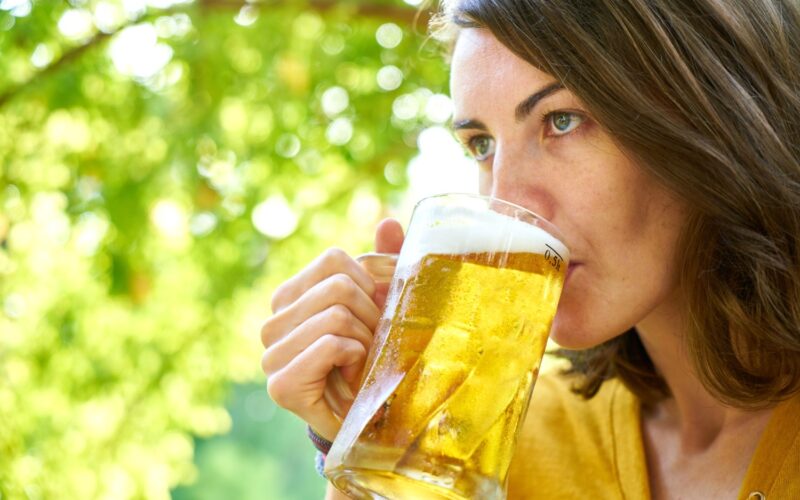Not only does alcohol affect your health, but it may also accelerate brain aging. When the daily alcohol intake reaches 2-3 units of alcohol, the gray and white matter aging speed of the brain will be accelerated by 3.5 years.
Taipei, Taiwan (Business Northeast) – How much do you drink? A new paper by a team of researchers at the University of Pennsylvania suggests that drinking one to two drinks a day may cause the brain to degenerate faster than people of the same age. The study found that increases from one alcohol unit, about half a glass of beer, to two alcohol units per day, the gray and white matter aging speed of the brain will be accelerated by 2 years. If the daily alcohol intake is increased to 2~3 units, the aging speed of the brain will be 3 and a half years faster. As alcohol intake increases, the side effect on the brain increase.
Using brain MRI data from nearly 37,000 adults in the UK Biobank, researchers found that people drinking no alcohol did not experience much brain changes when they took one unit of alcohol. But increasing alcohol intake from 1 to 2 units to 2 to 3 units per day reduced gray and white matter in the brain, and the effect curve rose in tandem with alcohol intake.
Gideon Nave, an assistant professor in the Neuroscience Program at the University of Pennsylvania, said research data shows that one unit of alcohol per day can cause the brain to age prematurely by about half a year. Two units of alcohol accelerate brain aging for 2 years. Two to three units of alcohol accelerate brain aging for 3.5 years. The brains of those who consumed 4 units of alcohol a day were more than 10 years older than those who did not drink. This shows that the effect of alcohol on the brain may increase “exponentially” upward.
What effects does alcohol have on the brain? According to research, ethanol in alcohol can cause abnormal or excessive secretion of neurotransmitters in the brain, affecting our ability to process emotions and brain responses. Excessive or rapid drinking activates the brain’s dopamine reward pathway, giving us a sense of excitement and pleasure. When we start lowering the amount of alcohol we drink, dopamine drops with it, which triggers our feelings of anxiety.
Too much alcohol can also increase the risk of cancer. Because after drinking alcohol, acetaldehyde is produced when the body metabolizes alcohol, and excessive drinking also increases the amount of acetaldehyde produced after drinking. Excessive acetaldehyde will produce reactive oxygen species, which will cause the body to oxidize and increase the chance of cancer. The more commonly caused cancers include esophageal cancer, liver cancer, head and neck cancer, and colorectal cancer. Acetaldehyde also damages proteins and DNA in the body, negatively affecting the immune system and brain.
Studies have shown that drinking too much alcohol can be harmful to health, so limit your maximum daily alcohol intake first. Mayo Clinic in the United States recommends that you can control the amount of alcohol you drink. The standard amount of one cup is about 150c.c. for red wine with 12% alcohol concentration, about 350c.c. for a beer with 5% alcohol concentration, and 45c.c. for a spirit with 40% alcohol concentration. The recommended intake is up to 2 cups a day for men under the age of 65, and up to 1 cup a day for women and men over the age of 65.
Because beer is high in sugar, experts recommend red wine, because it has more health benefits when consumed in moderation. Many studies have mentioned the benefits of drinking red wine, including antioxidants, beauty, and the prevention of cardiovascular disease. Studies by the National Institute of Health in the United States and Spanish scholars have mentioned that the antioxidant power of red wine has the effect of preventing colds.
According to Dr. Giovanni of the Catholic University of Campobasso, studies have found that drinking moderately and correctly may reduce mortality by 18%. It is recommended to drink a small amount of alcohol during meals, and try not to drink alcohol at other times to avoid excessive drinking, so as to make good use of the benefits of alcohol on the body and reduce the harm of excessive alcohol consumption.
Of course, there are many positive clinical studies on the health benefits of drinking a moderate amount of alcohol, but there are many harms caused by excessive alcohol consumption. Dietitians recommend that if you have the habit of drinking, you must start to reduce the amount of daily drinking and try to adjust to the safe range recommended above to reduce the harm of alcohol to the body. People not drinking don’t need to start drinking because of some benefits of alcohol. However, having a drink during the meal can increase the dining atmosphere and the fun of food, and it is a safe range that can be allowed by health.










